- Home
- Steven Ehrman
The League of Mendacious Men (A Sherlock Holmes Uncovered Tale Book 10) Page 3
The League of Mendacious Men (A Sherlock Holmes Uncovered Tale Book 10) Read online
Page 3
“It isn’t that I was not happy to see you as well, Inspector,” I said. It had occurred to me that my joy at seeing Holmes might have been interpreted as a slur upon the skills of the Scotland Yard Inspector.
“Think nothing of it, Doctor,” said Hopkins, waving away any concerns of mine towards his ego. “I value Mr. Holmes’s skills as much as yourself, and since you ask how he comes upon the scene, I can answer that for you.”
My quizzical brow plainly stated my curiosity.
“I was consulting Mr. Holmes on a puzzling, though not nearly so weighty, matter as this one when word reached me of this tragedy,” continued Hopkins. “As I was already with him, I took the opportunity to bring him along. If matters are as deep as they seem, I judge that I may have sent for him in any case.”
“You do yourself too little justice, Inspector,” said Holmes. “I have no doubt that you would have been able to acquit yourself admirably, but since I am here pray give us the details, Doctor, and please leave out nothing.”
I endeavoured to relay an accurate account of the events leading to the discovery of the body and what had occurred since. Holmes listened without interruption. Hopkins likewise listened attentively and took copious notes. When I finally finished, Holmes suggested that we examine the body.
Nearly all of the club members crowded around Holmes and the Inspector, clamouring for their attention. The only exception was Judge Bainbridge, who was lying down on a leather couch in a corner of the room. As he had had quite a shock, I thought this a good thing. I heard Colonel Pelham say that the Judge had taken a bit ill. I started to turn my attention to the elderly man, but I felt a tug at my elbow. It was Holmes.
“Watson, as you are the only unbiased witness, I request that you come with us.”
The Judge did not seem to be in distress. I noted that he had a drink by his side on a table, and gathered that any illness might be only the affect of strong spirits. This being the case, I followed Holmes and the Inspector into the murder room.
Once inside, Holmes and Inspector Hopkins both went to work. My friend made a close examination of the body. The cause of death was certainly evident, but Holmes seemed very interested in the contents of the man’s pockets. While Holmes was at the body, Hopkins took it upon himself to make a minute search of the room itself.
The energetic detective was on his hands and knees attempting to uncover any clues. The room seemed to have little to hide, but I made no attempt to discourage his efforts.
I returned my attention towards Holmes and saw him slip what appeared to be a small vial into his pocket. I wondered where he had found it. As I was pondering this, Holmes motioned for me to come to his side.
“Doctor,” he said as I joined him, “has anyone been permitted to come near the body outside of your eye?”
“No one, Holmes,” said I firmly. “Blake and I came in together and nothing was disturbed.”
“No one else entered the room?”
“Well, Hunter came in also, but he did not come anywhere near the body. The others began to crowd around the door, but no one else actually entered the room.”
“What of the Judge?”
“He never came back inside the room, Holmes, after he staggered out in a daze.”
“But he was most certainly alone with the body for a period of time,” said Holmes. “How long a period of time would you estimate that the Judge was alone in this room before he returned and joined you and the others?”
I wracked my memory and tried to relive the moment.
“I should say that the Judge was gone at least a minute,” I said. “Perhaps a bit more, but certainly not much more.”
“My understanding is that Judge Bainbridge was supposed to bring Mr. Wainwright back and to retrieve the votes of the membership. Is that correct?”
“Correct in every detail, Holmes.”
“Then you see the difficulty, Watson.”
“I fear not,” I replied. “Do you suspect the Judge of some perfidy in this matter?”
“I make no accusation as of yet,” said Holmes. “But let us replay the role of the Judge.”
Holmes walked to the entrance to the room. He then walked around the table and faced the chair. He stood motionless for a moment and then strode to the door. Inspector Hopkins had halted his examination of the room and was watching Holmes with rapt attention.
“How long would you say that my movements have taken, Watson?” Holmes asked as he turned from the door.
“Under thirty seconds I would say.”
“Actually under twenty seconds,” replied Holmes.
“Just what is your point, Mr. Holmes?” asked Hopkins.
“Simply that the amount of time that Judge Bainbridge was in this room hidden from view of the others is much greater than the time it would have taken him to discover the body and cry out for help.”
“And you read something nefarious in this, Holmes?” asked I.
“What else is there to think, Doctor? It is obvious that Judge Bainbridge has not been honest with us.”
Inspector Hopkins and I exchanged a glance, and each of us smiled. Holmes noted this and crossed his arms over his chest.
“Just what is it that the two of you find so amusing?” he asked.
“It is just that there is a very logical answer for the Judge’s action,” said I. “The entire world does not have the nerve of Sherlock Holmes. Judge Bainbridge came into this room and found a murdered man. He was stunned and he froze. Holmes, had you seen the man as he staggered from this room you would not doubt that his reactions were retarded somewhat. That would be an easy answer for why it took the old gentleman more time than it might otherwise.”
Holmes pondered this for a brief moment.
“Is that your opinion as well, Hopkins?” he asked.
“It is certainly a likely explanation, Mr. Holmes,” said the Inspector. “Of course it does not preclude the Judge from being a suspect.”
“There is no need to soothe my feelings, Inspector,” said Holmes. “It is obvious to me that I have made a miscalculation concerning the Judge’s actions. I overlooked the fact that he may have been taken aback.”
“We can certainly question him as to that fact, Holmes,” said I.
“That we will, Doctor, have no doubt.”
“Whoever the killer is, he has nerves of steel,” observed Hopkins.
“I should think that any man who can take a life in cold blood has such nerves, Inspector,” said I.
“But it is more than that, Doctor,” he replied. “We are all agreed that the murder was done in this room, are we not?”
I said yes and Hopkins took Holmes’s silence for agreement.
“The knife is thrust directly in the heart,” he continued. “While such a wound causes death nearly instantaneously, the victim may cry out. Even if no one investigates it at the time, it will be remembered when the body is discovered, and the culprit would be exposed.”
“That is capital, Inspector!” I cried. “The murderer must have been under great duress to take such a risk.”
“The risk is smaller than you might believe, Doctor,” said Holmes. “Let me set one possible scenario. The killer comes into the room, ostensibly to vote. The chair is placed in such a way that he can kill, and the next entrant will not be able to observe that a crime has been committed.”
“So it could be any one of the men,” I said. “Even the first person to vote could have done it.”
“That is true, Watson. I further believe that the killer likely crossed over to Mr. Wainwright and covered his mouth before dealing the fatal thrust of the knife.”
“But wouldn’t Wainwright have cried out when his mouth was covered?” asked Hopkins.
“Not if he believed it was part of the ceremony. Remember that we have a man alone in a room and blindfolded. The scene is already a macabre one. Suppose the villain whispers to Wainwright that he should remain still, and then the end comes quickly.”
“Th
at would cover the known facts, Holmes,” said I.
Hopkins was stroking his chin in thought.
“What say you, Inspector?” I asked.
“It is good enough as far as it goes,” he began, “but it is also pure speculation. It is little enough to go on.”
“That is true, Hopkins,” said Holmes. “The reconstruction I have described is likely the manner in which the murder was done, but this case will not be solved by such tactics.”
“Then how will it be solved, Holmes?” I asked.
“Through motive, Watson. One of the men in the other room had a reason to kill Mr. Wainwright. It is our task to determine which man has that motive. That will solve the case.”
“But I was here all night and I detected no animosity towards the man. Indeed the company seemed of good cheer. Moreover Wainwright was not well known to any member of the club, save perhaps Hunter. As I understand it, the club attempts to bring in fresh blood and avoids like-minded men and close friends.”
“It may prove difficult to find a motive so powerful as to convict the killer,” said Hopkins.
“How could he know death was tugging at his elbow?” I mused, thinking of the American reporter. “And to think that all Wainwright had on his mind tonight was to tell a good story and gain entrance to the club.”
Holmes had wandered over to the table and picked up the velvet bag. He emptied the contents into his hand.
“And he would not even have accomplished that had he lived, Doctor,” said Holmes, as he displayed the contents of the bag.
He held four white marbles and two black.
Chapter Five
“Blackballed!” I cried.
“Yes, Doctor,” said Holmes. “And as you can see, there are two black marbles. That means that Mr. Wainwright had two enemies here this night.”
“Are you suggesting a conspiracy against the American, Mr. Holmes?” asked Hopkins.
“It is too early to say, Inspector.”
“But it is an important clue, wouldn’t you say, Holmes?” I asked.
“Important? Perhaps, but at the very least it is an interesting development. It is impossible, of course, to say who voted against Mr. Wainwright, but we can ask.”
“Well, certainly one vote against was the murderer,” said I. “And whomever the other vote came from will surely confess it now.”
“Why do you believe so, Watson?” asked Holmes.
“Because it is a matter of murder. Surely that trumps all.”
“Doctor, simply because a murder now exists is precisely why everyone will deny casting a contrary vote towards Mr. Wainwright.”
“Do you really believe so?” I asked.
“Most certainly. The Inspector can tell you that most people will go to extraordinary lengths to avoid becoming entangled in a criminal matter.”
I saw Hopkins nodding his head vigorously in agreement.
“It is true, Dr. Watson. I fully expect all to deny voting down Wainwright. One person will be lying and the other is the murderer.”
“Then how are we to discover the killer if the innocent dissemble?” I asked, throwing my hands in the air in frustration.
“As I have stated, Doctor, we will solve this case through motive,” said Holmes. “To your knowledge, were any of the club members intimate friends with the deceased?”
“I really have no idea, but it seems unlikely based on their behavior, Holmes. Hunter sponsored Wainwright, so he must have more than a passing acquaintance with the man.”
“Any others?” prompted Holmes.
I thought back over the conversation of the evening.
“I did get the impression that Colonel Pelham had met the man on a previous occasion, but it was an impression only. Can we not simply ask this question of the club members?”
“Of course, we can, Watson, and we will. I am merely clearing away the brush.”
“I see that, of course,” I said. “I am certain that you will ferret out the killer quickly.”
“I am not nearly so sanguine, Watson,” said Holmes.”
“Why not?” asked I. “There are only six suspects.”
“True, my friend, but these are all men practiced in the art of deception. However, it matters not. Shall we begin?”
It was agreed. Departing the gruesome murder scene, we returned to the main room. The constable and the sergeant were standing by the only exit from the room, as if guarding it. The Judge was now sitting up on his couch, but he had an awful pallor on his face as if all the blood had been drawn from it. I watched him toss back a snifter of brandy as we emerged. He seemed a very troubled soul. The remainder of the group were seated at the table. Each man had a whiskey at hand. There was muted conversation going on as we entered the room, which ended as soon as our presence was felt. All faces turned towards the Inspector and Holmes in expectation of news. Before anyone else could speak, Blake leapt to his feet.
“Is it really murder, gentlemen?” he asked plaintively.
“Of course it’s murder,” said Hunter, who was next to Blake. “You saw the body yourself.”
“Still, I would like the opinion of a professional. I do not believe that you, Hunter, are an expert in matters of crime,” said Blake in riposte.
“Is that an example of the Irish wit that so charms the ladies, Blake?” asked Hunter, as he too came to his feet.
There was a marked tension between the two men.
“Wallace, you are making an ass of yourself,” said Blake. “Resume your seat.”
For emphasis Arthur Blake put his hand on Wallace Hunter’s shoulder. The balding man pushed the hand away and before anyone could react, he slapped Blake on the cheek. There was a resounding smack that echoed off the walls of the room.
For a moment Blake stood stunned, and then he let out a roar and sprang upon Hunter. Both men were of somewhat short stature, but the difference in body type could not have been greater. Whereas Hunter was slight of build, Blake had powerfully built shoulders and arms.
Blake had both hands around Hunter’s throat and was tossing him back and forth like a kite in the wind. Jonathan Sawyer came to his feet and thrust himself between the two men. Colonel Pelham also joined the fray as a peacemaker. Just as the two men were pulled apart flailing hands knocked off Sawyer’s glasses and they went spinning across the floor, coming to a stop at Holmes’s feet. I heard the Judge calling for an end to fighting from his couch. Captain Marbury reacted not at all and watched the fracas with a bemused detachment.
By this time the Inspector and myself had aided in ending the scuffle. Holmes handed Sawyer back his glasses and everyone resumed his seat. With calm restored, the Inspector began to speak.
“Gentlemen, I realize that emotions are running a bit high, you’ve had a great shock.”
“All save one,” I heard Holmes murmur.
“As you know, Mr. Sherlock Holmes arrived tonight as an aide to Scotland Yard,” continued Hopkins. “I have worked with him before, and I value his methods. He has questions that he will put to you. I ask that you answer him as you would the Yard. Mr. Holmes.”
Hopkins motioned for Holmes to take the floor.
“I would first like to answer Mr. Blake’s question,” began Holmes. “The answer is that yes, it is unquestionably murder. The question then becomes who killed Mr. Wainwright and why.”
“Is the why really so important, Mr. Holmes?” asked Colonel Pelham.
“In this case it most certainly is of paramount importance, sir, since any one of you could have committed the crime.”
There was a stirring, and then the deep voice of Captain Marbury was heard.
“That is not true, Mr. Holmes. The lad was quite alive when I cast my vote.”
“Then you spoke to him,” said Holmes.
“That was quite against the rules of the club, Captain,” said Blake. “Indeed, it is grounds for dismissal.”
“Half a moment!” cried Captain Marbury. “I did not say that I spoke to him. I merely s
tate for a fact he was alive when I voted.”
“Then you must have walked around the table to see him,” said Holmes.
“No, I didn’t do that either,” said the Captain glumly.
“Then what you mean is that you assumed he was alive when you voted,” said Holmes. “The high back of the chair prevents anyone from seeing the potential inductee. So unless a person spoke to Wainwright or walked around the table to face him, no one can say with any certainty that the man was alive when any of you voted. Is that agreed?”
“Mr. Holmes, your logic is unassailable. Any one of us could have perpetuated this foul deed,” said Blake.
“The field of suspects would appear to be wide open, Mr. Blake,” said Holmes. “But before we talk of the murder, I would like to clear up an ancillary matter. Which of you gentlemen blackballed Mr. Wainwright’s club admission?”
Holmes’s inquiry received only puzzled looks in return.
“Come now, gentlemen. There were two votes against Mr. Wainwright. I ask who cast those votes.”
“Do you mean to say that you have examined our votes?” rumbled Captain Marbury. “That is a breach of the club’s rules. Those votes are sacred and not to be shared with non-members.”
“Captain, please,” said Hopkins. “Surely you can see that the law supersedes your club rules.”
“He’s right, Joseph,” said Colonel Pelham. “Objecting is only dragging out the proceedings. For myself, I deny blackballing Wainwright.”
Holmes put the question to each man in turn and each denied casting a contrary vote against the deceased man.
“Very well,” said Holmes. “We will table that matter for the moment. Did any of you notice anything amiss when you cast your vote? Judge, you were the first to cast a vote. Did anything out of the ordinary happen?”
“Simply voting is out of the ordinary, sir,” intoned the retired jurist from his couch. “A seat at the League of Mendacious Men does not open up every day or even every year. It is a high honour to be put up for membership.”
The Judge’s statement was met with hearty approval from the club members.
“But that aside, I can say there was nothing amiss that I noticed, and I have a keen eye, sir. In any case, as I was the first vote, Wainwright had to be alive at that point.”

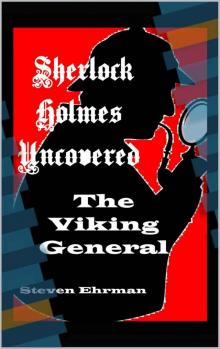 The Viking General (A Sherlock Holmes Uncovered Tale Book 9)
The Viking General (A Sherlock Holmes Uncovered Tale Book 9)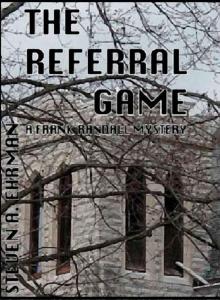 The Referral Game (A Frank Randall Mystery)
The Referral Game (A Frank Randall Mystery) Collection of Four Short Stories
Collection of Four Short Stories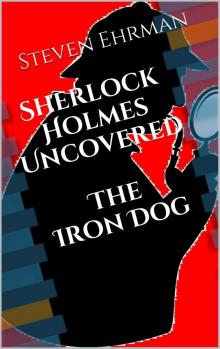 The Iron Dog (A Sherlock Holmes Uncovered Tale)
The Iron Dog (A Sherlock Holmes Uncovered Tale)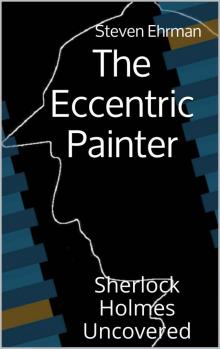 The Eccentric Painter (A Sherlock Holmes Uncovered Tale)
The Eccentric Painter (A Sherlock Holmes Uncovered Tale)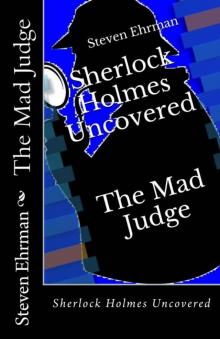 The Mad Judge (A Sherlock Holmes Uncovered Tale Book 3)
The Mad Judge (A Sherlock Holmes Uncovered Tale Book 3)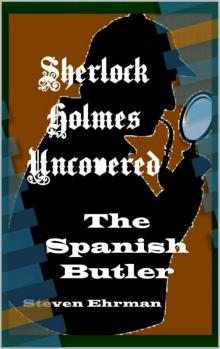 The Spanish Butler (A Sherlock Holmes Uncovered Tale Book 8)
The Spanish Butler (A Sherlock Holmes Uncovered Tale Book 8)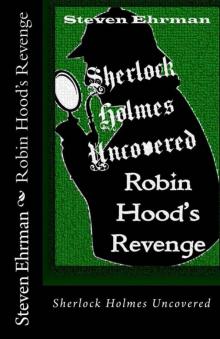 Robin Hood's Revenge (A Sherlock Holmes Uncovered Tale Book 7)
Robin Hood's Revenge (A Sherlock Holmes Uncovered Tale Book 7)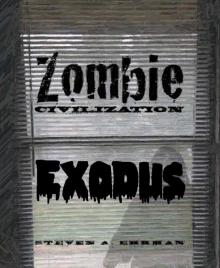 Zombie Civilization: Exodus (Zombie Civilization Saga Book 2)
Zombie Civilization: Exodus (Zombie Civilization Saga Book 2)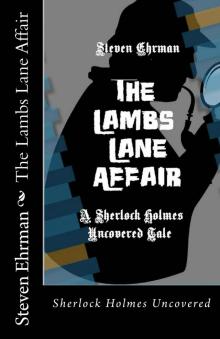 The Lambs Lane Affair (A Sherlock Holmes Uncovered Tale Book 5)
The Lambs Lane Affair (A Sherlock Holmes Uncovered Tale Book 5)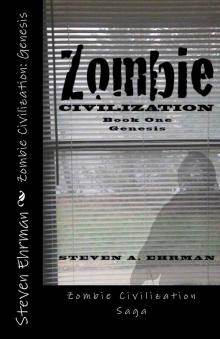 Zombie Civilization: Genesis (Zombie Civilization Saga)
Zombie Civilization: Genesis (Zombie Civilization Saga)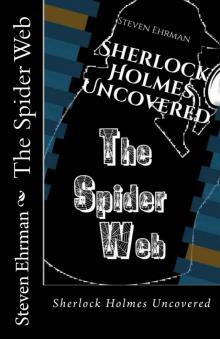 The Spider Web (A Sherlock Holmes Uncovered Tale Book 4)
The Spider Web (A Sherlock Holmes Uncovered Tale Book 4)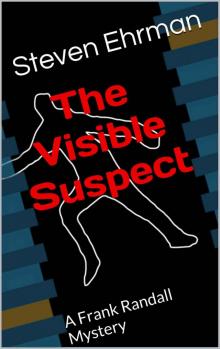 The Visible Suspect (A Frank Randall Mystery)
The Visible Suspect (A Frank Randall Mystery)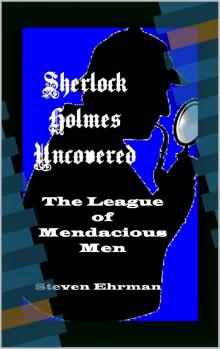 The League of Mendacious Men (A Sherlock Holmes Uncovered Tale Book 10)
The League of Mendacious Men (A Sherlock Holmes Uncovered Tale Book 10)